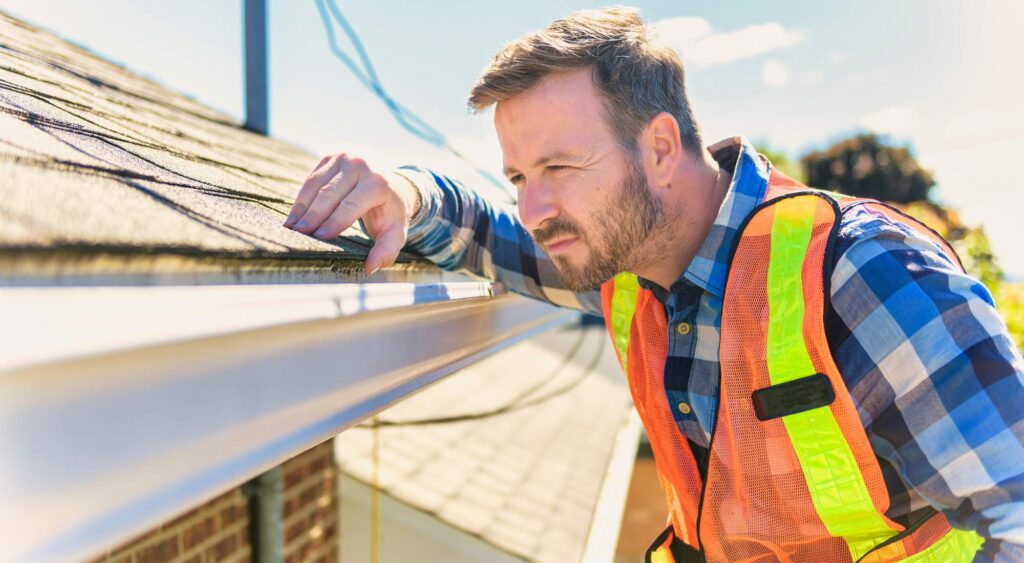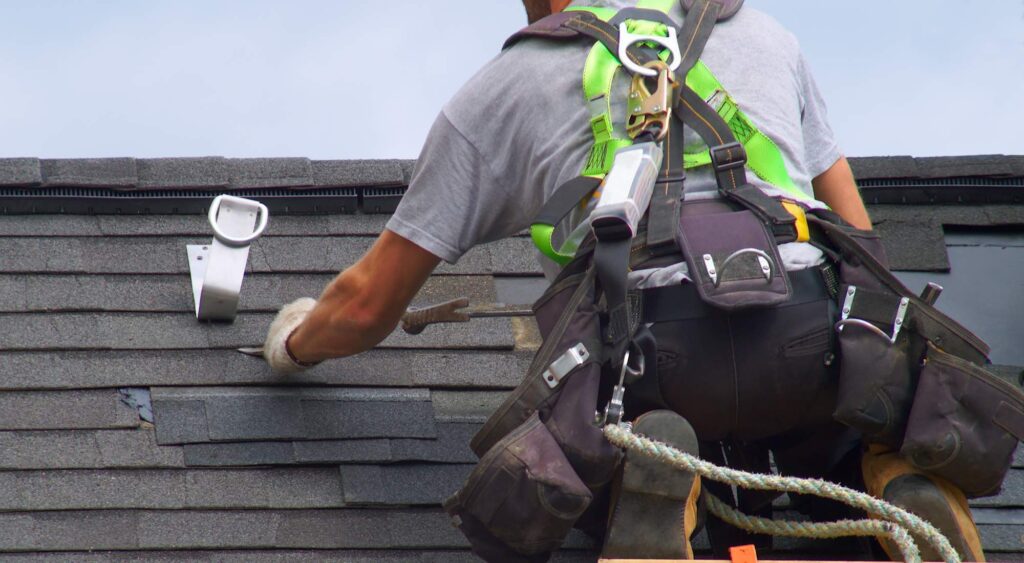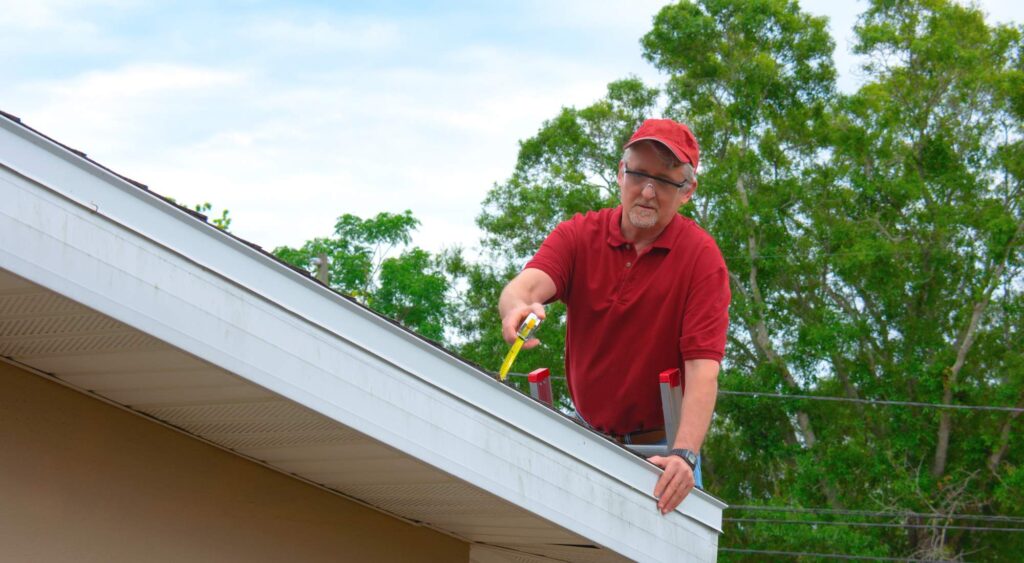No one gets excited about these four words: “You need a new roof.” We get it. Roofs are expensive.
But how does one take care of a roof? Do you need an inspection? And how often should a roof be inspected?
Performing routine roof inspections can help identify problems earlier, preventing more significant and costly problems down the road.
Let’s review roof inspection basics.
Table of Contents
- How Often Should You Have Your Roof Inspected?
- 4 Factors That Determine How Often Your Roof Should Be Inspected
- Why Is It Important To Have Your Roof Inspected?
- What To Expect From a Routine Roof Inspection
- Additional Roof Inspection FAQs
- Let Oscar Roofing Professionally Inspect Your Roof To Detect Any Minor Issues Before They Become Major Problems
How Often Should You Have Your Roof Inspected?
Well, if you’re reading this thinking, “I didn’t even know I needed to get my roof inspected regularly,” you aren’t alone.
Roofs should be inspected routinely, so small problems don’t lead to big problems in the future. But how often should you have your roof inspected?
The general guideline is one to two times per year. But there are a few different factors to consider.
4 Factors That Determine How Often Your Roof Should Be Inspected
#1: Age of Your Roof
Probably unsurprisingly, older roofs should be inspected more frequently as there are more likely to be problems.
However, even newer roofs need to be inspected.
New roofs can still have problems if they are not installed properly. Improper installation can lead to major problems. Regular inspection also allows you to correct any problems before a warranty expires.
#2: Climate
Overall climate affects the durability of roofs. Some of these factors include:
- Humidity: Climates with high humidity can cause damage to your roof as mold can grow, wood can rot, and shingles can curl and crack. Metal roofs are also more susceptible to rust in high humidity.
- UV exposure: Climates with higher UV exposure create more stress on roofs. The protective coating on shingle roofs can break down after extreme heat, making the roof more vulnerable to damage. UV exposure can also cause blistering on your roof which can cause leaks if not fixed.
- Extreme cold and snow: Freeze and thaw cycles can damage shingles. Ice dams can also form and block the paths to the gutters. Water can form underneath the shingles causing damage as well.
- Temperature fluctuations: Abrupt temperature fluctuations during season changes can also impact your roof. Roofing materials can expand and shrink during sudden temperature swings, which can damage your roof. Shingle and wood roofs are the most vulnerable to this.
A properly insulated crawl space or attic matters to the health of your roof! Check out The Department of Energy for the recommended insulation for your climate.
#3: Adverse Weather Events
Tornadoes, hurricanes, or powerful storm systems can be devastating. It’s important to have your roof inspected after major storms as some damage may not be obvious.
Some weather conditions that can adversely affect roofs include:
- High Winds: Roofs are a major target of wind damage. Strong gusts of wind can create uplift pressure causing strain on the roof’s edges, and the negative pressure from the wind can cause shingles or metal panels to lift off. In the most extreme cases, wind can cause complete roof failure. Flying debris caused by high winds can also cause damage to your roof.
- Hail: Bruising or cracking of shingles can occur from hail damage. While some may be visible on the roof, sometimes it can’t be seen until shingles are inspected from behind. The damage from hail can be more than cosmetic and can impact the integrity of your roof.
While you can’t stop Mother Nature, you should work with a professional roofer as they can help with product selections to protect you from extreme weather.
Oscar Roofing has been serving the Bloomington and Indianapolis community for over 20 years. We will guide you through roof selections that will keep you and your family safe during storms. Our 5-year warranty and a lifetime warranty on all materials will give you peace of mind that we use the best quality materials and stand by our work.
#4: Amount of Tree Coverage Around Your Home
While tree cover surrounding your home can block some wind and provide shade to block UV rays, trees can also cause damage to your roof if you do not maintain the trees.
Tree branches should never touch the roof. A buildup of leaves and branches can cause damage if it sits on your roof. This can also cause water buildup in pockets of your roof where debris accumulates.
Trees also are home to lots of critters. If it’s close to your home, then animals such as squirrels will likely end up on your roof as well, which can damage shingles.
As mentioned previously, high winds can cause flying debris to include branches from trees. Maintaining surrounding trees is important to protect your roof.
Why Is It Important To Have Your Roof Inspected?
Routine inspection of your roof can pay off. Here’s why:
- Extending your roof’s lifespan: An inspection can extend the lifespan of your roof by detecting problems early. Roofs are a major investment, and no one wants to replace a roof before they have to.
- Safety: Routine roof inspections can be life-saving. You don’t want to find out your roof has a problem in the middle of a major weather event. As FEMA recommends, stay ahead of storms as much as possible. Major weather events such as tornadoes or hurricanes can result in major damage to even perfect roofs. So repairing even minor problems early can pay off when Mother Nature strikes.
- Cost savings: There are many financial benefits of routine roof inspections.
- You can repair problems, which is cheaper than a roof replacement.
- You can fix problems within your warranty period.
- You may prevent insurance from canceling your policy or raising rates.
- You can protect your property value by ensuring your roof is in great shape.
- Protect your home: You can’t always see roof damage, and even small leaks can go undetected. Leaks can result in:
- Wood rot
- Mold or mildew
- Electrical problems
- Damage to household goods
While we hope routine roof inspections will prevent you from having to replace your roof, there are some circumstances where a roof replacement is needed. See our guide on how to replace your roof on a budget.
What To Expect From a Routine Roof Inspection
Now that we have discussed how often you should have your roof inspected and the benefits of routine roof inspections, let’s talk about what can you expect when you have a roof inspection.
A professional roofer will look at three main things when conducting a roof inspection.
Inspection of the Structural Components
The first part of the inspection will be examining the integrity of the structural components of the roof. The roofer will get on your roof and check all aspects of the roof from the underlayment to the top material such as the shingles. They will look for any indications that your roof may be sagging or if it has any soft spots.
The inspector will also examine gutters, skylights, chimneys, vents, soffits, and fascia. A defect in one of these areas can lead to other problems with your roof.
Inspection of Materials
The inspector will also examine the materials of your roof. This includes looking for missing or damaged shingles. They will also look at the flashing for dents, corrosion, and signs of water damage. Professional roofers can also check for improper installation of the roof such as incorrect nailing and overall quality of the workmanship.
Inspection of the Interior
Lastly, a thorough roof inspection will also include looking at the inside of your home. Inspectors should check attic spaces to examine the insulation, signs of water, mold/mildew, wood rot, or other damage.
Additional Roof Inspection FAQs
Are There Different Types of Roof Inspections?
Yes, there are three different types:
- Physical inspections: This is your basic roof inspection where the inspector will be on your roof, looking for signs of damage.
- Drone inspections: This type of inspection uses a drone camera to look at the roof integrity. This option is preferred when a roof is very steep, making it dangerous to be physically on the roof.
- Infrared inspections: This type of inspection uses infrared scanners to look for signs of damage. This technology scans for temperature to detect moisture that may not be visible to the naked eye.
Can You Perform a DIY Roof Inspection?
You can, but it does not come without major risks. Even a roof on a one-story home that is relatively flat can be dangerous. Proper equipment including a harness is essential.
In addition to the safety concerns, you also run the risk of not catching items that a professional can detect. These undetected problems can have major consequences down the road.
What Issues Can a Roof Inspection Detect?
A roof inspection by a professional can detect:
- Leaks
- Mold/mildew
- Structural damage
- Clogged gutters
- Ventilation problems (insulation)
- Worn shingles or other signs of wear and tear
- Missing singles
- Signs of roof aging (bald, cracked, and curled shingles)
How Long Does a Roof Inspection Take?
Most roof inspections take about an hour to two hours for a residential home. It depends on:
- The size of your home
- The pitch of your roof
- Roof accessibility
- Roof type
How Much Does a Roof Inspection Typically Cost?
It depends on the factors listed above. In addition, costs may differ by region. The typical cost according to Home Advisor is $125 to $358.
Contact Oscar Roofing for more information about how much your roof inspection will cost.
Let Oscar Roofing Professionally Inspect Your Roof To Detect Any Minor Issues Before They Become Major Problems
When it comes to a roof inspection, trust is non-negotiable. You need someone to not only have the expertise to identify issues but also deliver recommendations that you can bet on.
That’s where Oscar Roofing comes in.
You can count on us for a comprehensive inspection, providing you with peace of mind that your roof is ready for anything Mother Nature sends your way. Trust our guidance on any repairs, knowing we only recommend a roof replacement when it’s truly needed.
Backed with two decades of expertise, Oscar Roofing is the leading roof expert across Indianapolis, Bloomington, and surrounding areas.
As proud Owens Corning Preferred Contractors, we guarantee top-notch quality and reliability in every project. Our fully licensed, bonded, and insured roofers guarantee professional craftsmanship.
Your home and your family are in good hands with Oscar Roofing.





